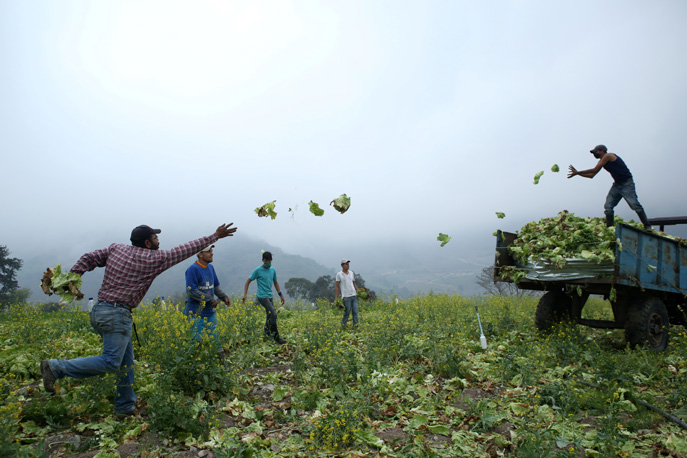Comment: Dr Suchith Anand of Global Open Data for Agriculture and Nutrition calls for a rejection of protectionism and democratisation of information to address hunger and poverty in vulnerable agriculture-dependent countries
The number of hungry people in the world reached 821 million in 2017, or one in every nine people, according to the latest issue of The State of Food Security and Nutrition in the World. Hunger is on the rise in almost all African sub-regions, making Africa the region with the highest prevalence of undernourishment.
In times of crisis, the world’s poorest are likely to run out of food, and – at the extreme – to go for days without eating, putting health and wellbeing at risk. The International Food Policy Research Institute (IFPRI) is currently undertaking studies on the global poverty increase likely to arise from Covid-19. Preliminary results show that the world economic growth rate has already fallen 1%, compared with a similar period in the previous year, translating into an increase in the extreme poverty rate of between 1.6% and 3% globally, depending on whether the slowdown is through productivity or trade disruption.
The UK, US and Europe have a complicated supply chain system and are dependent on food imports from a range of countries
But this is also exacerbated by the fact that a majority of the world’s poorest people depend on agriculture for their livelihoods.
Covid-19 will have both direct and indirect impacts on food systems. How severe these will be will depend on how national governments and local populations react, and how well-prepared they are. Last month, the CEO of the World Business Council for Sustainable Development (WBSCD) Peter Bakker presented a Call to Action, seeking world leaders to design Covid-19 response measures that minimise the risks of global and regional food security crises in coming months. The signatories comprised of major businesses, farmers’ groups, industry, non-governmental organisations and academia, showing the cross-party consensus on the urgent interventions required. (See ‘We can’t just talk about science-based targets now’)
Some evidence of the impact of Covid-19 on agriculture has already emerged out of China, where farmers are facing a daunting planting season as they deal with shortages in labour, seeds and fertilisers. A survey of village officials in 1,636 counties by the Qufu Normal University in China found that 60% of the respondents were pessimistic or very pessimistic about the planting season. In terms of the on-ground impact, the lockdown in Wuhan completely collapsed the local agriculture and farming, and China had to mobilise produce from other regions into Wuhan.

Countries around the world do not have the capacity to replicate this. For example, the UK, US and Europe have a complicated supply chain system and are dependent on food imports from a range of countries. To maintain their food security, they are very much dependent on the performance of exporting countries. The lockdowns in these countries are also nationwide, in comparison to China’s isolation of just the Wuhan region, and therefore it impacts the complete supply chain. Unless critical measures are undertaken to ensure supply chains and operations remain open, there would be a fundamental impact on the way we produce, harvest and distribute food.
The mid-spring to summer months are peak harvest season, and there is an increased risk of produce wastage in farms if there is a shortage of labour in these critical months. The harvest window for many seasonal crops are often days, and therefore governments need to ensure farmers have access to seasonal labour amid the lockdowns.
A pan-African shutdown will disrupt global food supply in unimaginable ways. Our success depends on their success
A few countries have begun to freeze imports and exports, but in the long term, it is important that countries resist protectionism. Under our current complex trade structures, the fluidity of the food systems must be maintained in order to ensure food and livelihood security. Keeping these channels open will help governments respond and deal with the current crisis better, instead of diverting attention towards re-adjusting the economic and trade systems.
Most importantly, we need to support countries in Africa, the food basket of the world, in dealing with the crisis before it starts to spread deeper. A pan-African shutdown will disrupt global food supply in unimaginable ways. Our success depends on their success.

Farmers and producers – mainly in developing countries, although on a global level – are struggling to cope with this crisis, with income losses expected to exceed $220bn in developing countries due to the restrictions of food circulation, access to markets and social distancing. One of the most important components of maintaining the global food supply chain is the creation, access to and use of reliable, up-to-date data for all stakeholders involved. Governments should collect and share data, as well as support research, on the impact of the Covid-19 pandemic on food systems.
A greater availability of open data across Africa and Asia would be of great use to communities in the recovery from the pandemic, providing timely information to policymakers and helping monitor, prepare for, and respond to Covid-19 and any similar future crises. This would, however, call for investment in democratising data processes, reducing the digital divide and increasing access to information for the poor, especially women. Governments across the world need to commit to fully supporting the provision of open data policies in agriculture right now, else we will not stand a chance to recover from another pandemic.

Dr Suchith Anand is chief scientist at Global Open Data for Agriculture and Nutrition (GODAN). Foteini Zampati and Kiringai Kamau contributed to this article.
This commentary is part of our in-depth briefing Building back better: Ethical Corporation examines what Covid-19 will mean for sustainability
Godan IFPRI food security Coronavirus WBCSD food supply chain pandemic

